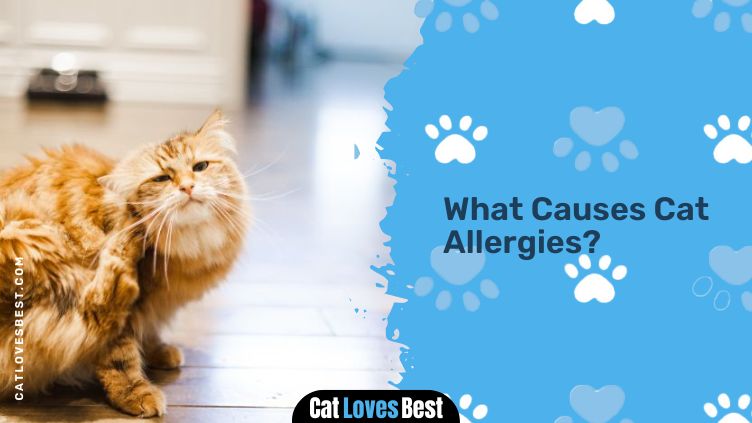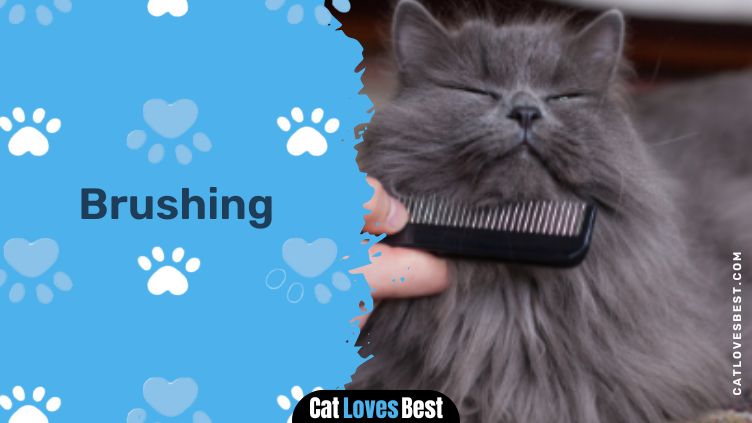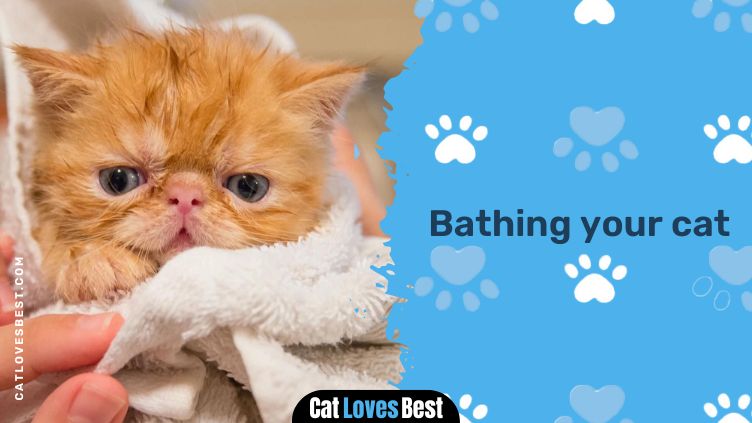Main Coons are one of the large size domestic cat breeds. This breed is known for its large double-coat fur. One of the other specialties of this cat is that they are very gentle. People like to adopt them for this very particular reason.

However, if you are allergic to cats you might want to reconsider your option of adopting a Maine Coon, Here’s why…
Are Maine Coon Cats Hypoallergenic
The answer would be no, people love Maine Coons because they are big and fluffy, also they are very gentle in nature. But this dream for some people to adopt this breed could turn into a nightmare if they got a cat allergy. However, it doesn’t mean people with allergies cannot adopt one.
As a matter of fact, all cats can be allergic, as they produce a kind of protein in their skin which is the main culprit behind this problem. Some cat breeds naturally produce this protein less than others. On the other hand, scientists are working on creating genetically modified cats, which will help people with allergies to adopt any breed.
I have done my research on the topic and found various solutions for people with cat allergies. I have mentioned them in this article below.
What Causes Cat Allergies?
All cats produce a kind of protein called “Fel d1” in their body that helps them to protect their skin. Their body manufactures this protein inside the skin, as Maine Coon is a long-haired breed, dead skin gets stuck into his fur and when he grooms himself, this protein starts spreading all over his body.

“Fel d1” is also produced in their salivary glands.
So there is a good chance that you might get your cat allergy triggered just by petting them and then touching your face. Sometimes it happens that some of the fur or the dander gets airborne, this would make the protein spread in the air.
If you inhale even a small particle when you are allergic to cats, it would create a situation where it can trigger your allergies.
These allergens are also found in the urine of cats. So use as much protection as possible around the areas where your cat does his business. Urine is in a liquid form, hence it is possible that “Fel d1” proteins are airborne around the place where your cat urinates.
What Are Maine Coon Cats Allergic To?
There are various types of allergies in cats like dust-mite allergy, food allergy, mold allergy, contact allergy (certain allergenic substances like certain kind of shampoo or wool, etc.), environmental, flea, pollen, etc. out of these the most common are:
- Flea allergy
- Dust mite allergy
- Mold allergy
- Pollen allergy
1. Flea Allergy
Flea allergy is the most common among all cats. If your kitten is not allergic, a flea bite won’t have any major effects on her body, but if he is allergic and gets a flea bite, it might cause some trouble.
When a flea bites your allergic cat, proteins in saliva of the flea would make his body react to it, and it will give an intense itching sensation in that area. Which may lead to different kinds of health complications.
In such case you might want to use a soothing shampoo to reduce their irritation or give them some antibiotics, however, it is recommended to consult a vet in this matter.
2. Dust Mite Allergy
Dust Mite allergy is caused by small pests called dust mites, you can find them anywhere in your house, in curtains, sofa, bed, or carpets. Dust mite’s excretion contains specific proteins, when they are inhaled, their body will show an allergic reaction.
To check if your cat is suffering from this allergy, you would notice them itching, more often in a particular area of their body, crusty skin patches, coughing or wheezing, hair loss in some part of their body, and red spots.
There is no permanent solution for dust-mite allergy, though you can change the environment your cat lives in, or you can also treat them with immunotherapy. Consultation with a vet is highly recommended, as you might not want your cat to suffer.
3. Mold Allergy
There is no cure for mold allergy, but you can still consult a veterinarian and give him some relief from the allergic reaction. This allergy can happen due to digestion or inhaling of spores or any kind from mold source.
When your cat is suffering from a mold allergy, you would notice hair loss, red skin, and scaly skin in some parts of the body, other than that you will find your cat licking or chewing their paws and skin.
4. Pollen Allergy
Just as with mold allergy, there is no solution to pollen allergy. You might want to consult your veterinarian if your cat shows symptoms like sneezing, coughing, running nose, watery eyes, and skin rashes. These symptoms may indicate pollen allergy in cats.
This Allergy is usually caused by inhaling pollen. They are found as powder-like substances in seed-producing flowers and can be airborne. It is a part of the reproductive system of plants.
Solutions for Avoiding Allergies
What can we do to avoid getting allergies? Well, there are various things you can do to avoid allergies, for you and your cat. I have taken the liberty to gather some of them for you…
Brushing

Brushing your cat regularly might drastically reduce the chances of spreading any kind of allergens. This is because when you are brushing them, you are removing off small dead skin along with some of their fur coating, this also removes any fleas and other small pests. One more benefit is they won’t shed hair that much all around our place…
Bathing your cat

Bathing your cat weekly would reduce the allergen count by almost 80-85%. You can buy a shampoo specifically for this purpose, It will wash off the allergens and dirt along with small nasty bugs. Bathing will also soothe their skin and make them feel relaxed.
Keep your hands clean
Always clean your hands after handling your cat or petting them, and also if you handled their bed or any of the objects they use. Wash your hands before touching your face. This way, you are not allowing any unwanted particles near your nose or mouth.
Clean home regularly
Cleaning your place would be really helpful for your overall allergy episodes. Make sure when you clean your house, you clean each and every place your cat might get to, that way you are cleaning off all the reasons that can trigger your allergy.
Clean litter box regularly

A litter box is where there is a really good chance of allergens being present. You might want to wear a mask and gloves while cleaning this place.
Another reason for cleaning litter boxes is that it develops ammonia after some time, as cat urine contains traces of ammonia. Bacteria in the litter would also react to it and create more ammonia, which has a stinky smell.
Set area limits
Restricting your cat to certain areas, like your bed or bathroom, or living room sofa can drastically improve your chances of not getting an allergy. This way it would be easy for you to clean your place, as you know which areas you don’t have to clean.
However, it would be challenging to train your cat to avoid going to these areas.
Anti-allergens
There are various anti-allergen sprays available on the market, you can spray these at any place in your home where you feel like there are allergens present. These sprays help neutralize the dander.
These products are designed to counter the Fel d1 protein, thus reducing your cat allergy episodes.
Medications (for humans):
Anti-histamines, Decongestants can be taken to reduce the effect of symptoms, but these are short-term solutions. However, if you are looking for a long-term solution, Immunotherapy might just be your best option. It would not cure your allergy, but it might reduce the number of allergy episodes.
FAQs
Can a person with cat allergy adopt a Main Coon?
Yes & No, It is recommended to not adopt this breed as it can most likely trigger your cat allergy. However, If a person has decided to adopt this particular breed he/she should take precautionary measures to avoid the allergy being triggered.
Can I get allergic to cats after adopting one?
Yes, A person can get allergies at any point in their life. Our immune system is constantly evolving, we have no say in the working of our body, if our body decides that it is being attacked, it will react to it.
Cat allergies can sometimes happen years after adopting a kitten.
Which cat breeds can I adopt if I have a cat allergy?
Bengal, Balinese, Burmese, Cornish, Devon-Rex, Javanese, Oriental Short-hair, Siberian, and Sphynx are hypo-allergic cat breeds that produce less “Fel d1” protein than all the other breeds. Although this does not mean you won’t get allergy episodes, it is just that these breeds might trigger your allergies less than others.
What cat breeds should I avoid if I have a cat allergy?
If you have a cat allergy you should probably avoid these breeds.
Persian, Maine coon, Norwegian forest cat, Himalayan, Manx, and Cymric.
However, if you are a fan of these breeds you can adopt them, but you need to be careful and take precautionary steps for your allergies.
Conclusion
After reading all this, If you are a person with allergies and want to adopt a Maine Coon, I recommend you follow all the steps to avoid your allergy getting triggered. I would do the same. After all, who would miss a chance to play and cuddle with this furry friend, right?
However, if your allergies are very severe, I would suggest going after other cat breeds which are hypo-allergic.
References:
- Allergies in cats — Wagwalking
- Allergic to your cat? — vet.osu.edu
- Hypo-allergic cats — PetMD
- “Fel d1” in Cats for cat allergy — National Library of Medicine

